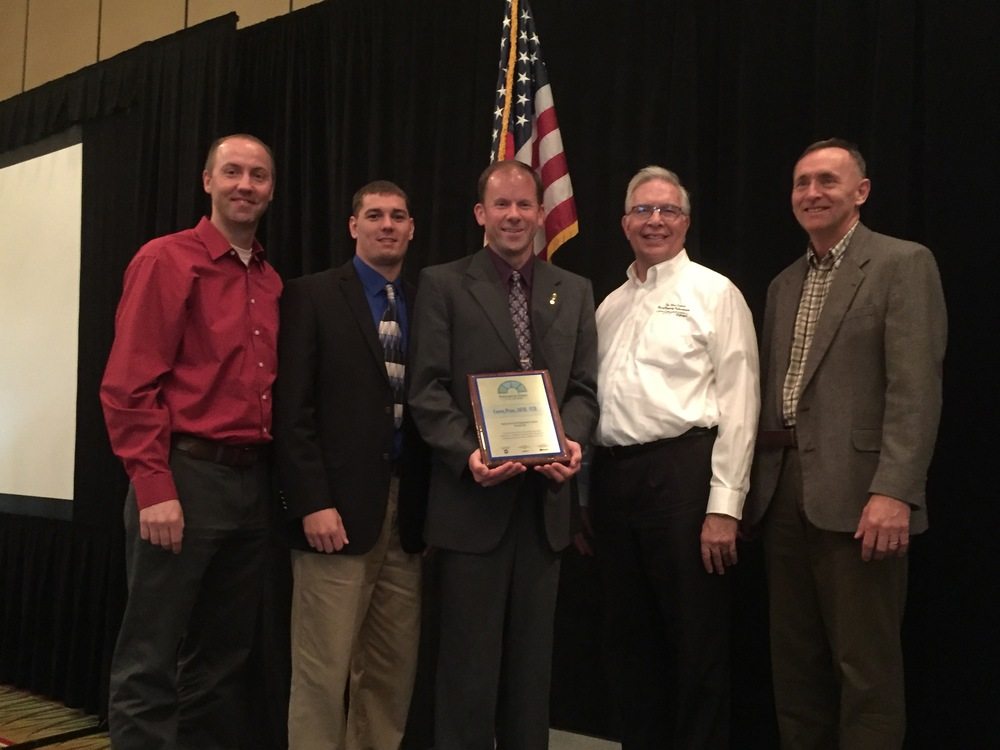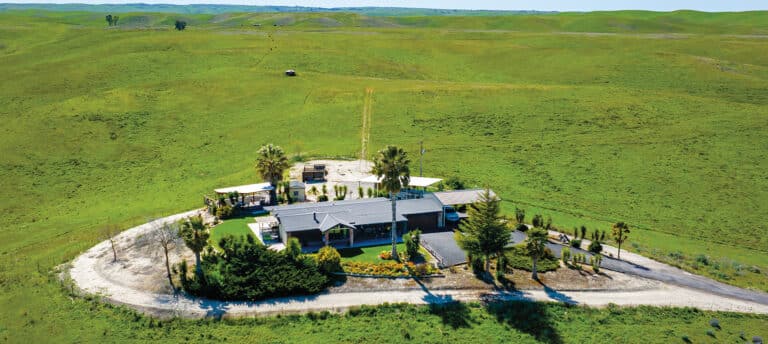
One of Corey Prins’ fondest memories growing up on the small family farm near Edgerton, Minnesota, was the hours he spent in the tractor. As the eldest son, Prins had a lot of responsibility and was delighted when his father, Lloyd, delegated crop responsibilities to him in his teen years.
“At a young age Dad had me out cultivating, and I loved every minute of being out on the tractor,” Prins says. “I grew up loving everything about crop production and the land. I knew then that I would end up doing something in agriculture—I just didn’t know what that would be.”
Those were formative years for Prins, who would go on to South Dakota State University to earn a bachelor’s degree in agribusiness with a minor in agronomy. After graduation Prins pursued a career off the family farm as the farm wasn’t large enough to support two families. After a stint in the seed business, he went into farm management, joining Northwestern Farm Management Company in Marshall, Minnesota, in 2006.
“When I got into farm management, I felt like I had the world by the tail,” Prins recalls. “I told myself that I’m doing all the things that a farmer does except for operating the tractor. But I can get that fix by helping Dad when we go visit the family farm.”
Farm Manager of the Year
The passion for the land and hands-on approach with working with his clients has served Prins well in his professional life. This year, Prins was recognized for that success by being named the 2015 American Association of Farm Managers and Rural Appraisers (ASFMRA) Professional Farm Manager of the Year, which was presented to him at the association’s annual meeting in San Antonio this past fall. Prins says it was an honor to receive the award from ASFMRA, an organization that he credits with strengthening his credentials as a professional farm manager.
“ASFMRA-accredited members lead in their respective fields by meeting the complex needs of agriculture’s changing environment,” Prins says. “In addition, the relationships that I have built across the country have broadened my knowledge of different cropping systems and created a network of contacts for sharing information and solutions to common problems.”
Prins’ leadership in ASFMRA started early in his career, and in 2012 he was recognized for that service with the ASFMRA Early Career Award. Prins’ passion within the organization is continuing education and professional excellence in the field of farm management; he is currently serving as chairman of the association’s Management Education Committee. He received the ASFMRA’s H.E. Buck Stalcup Excellence in Education award in 2013 for contributions in developing ASFMRA’s accelerated delivery of the accreditation program.
“Through ASFMRA, I have had the opportunity to teach farm managers in just about every state west of the Mississippi River,” Prins says. “It has truly been an enriching experience where the power of the network that we have within ASFMRA has really come through.”
Prins has twice taught farm management courses in California, recalling that it was initially intimidating being a Midwesterner and speaking in front of a group of professionals who manage crops in a completely different geography. But that apprehension quickly turned to excitement.
“The experience has proven to be extremely valuable to share information on farming practices and issues such as conservation and drought,” Prins says. “We’re finding that many of the issues that occur in California—and their solutions—can be shared in the Midwest. And, many of the farm managers that I interacted with have become friends.”
Customized solutions
Prins brings the broad industry perspective and deep knowledge of agronomy to his current role of serving clients on farms and rural land in Minnesota and Iowa. Prins’ responsibilities include assisting land owners with leasing, making and maintaining capital improvements, reviewing easements, marketing grain and purchasing crop production inputs. Every client has unique requirements and every piece of property is different, says Prins.
As farmland is passed down from generation to generation, the role of the farm manager is increasingly important in helping the new land owners manage the farmland in a profitable and sustainable way.
There are many issues to manage—uncertain commodity prices and input costs, government regulations, environmental issues, variable land values, and evolving farming practices and technologies are just a few. Beyond helping clients on the financial side, Prins also works to help them improve land stewardship through conservation strategies such as tile drainage installation and conservation tillage practices.
“Increasing environmental regulation is the No. 1 issue for land owners and new farmers,” Prins adds. “It’s increasing the cost and time it takes to make capital improvements, and communicating the permit and environmental requirements to clients takes careful explanation.”
Exceeding expectations
While his farm management responsibilities vary by season—and even day by day—getting out of the office to interact with clients, inspect rural properties and make recommendations on revenue-generating crop management technologies and sustainable land improvements for his clients are highlights.
“The exciting part of my job is when I’m able to report higher-than-expected profit as a result of reduced costs, higher commodity prices or above-average grain yields,” Prins says. “Exceeding a client’s expectations never grows old.”
Farm management is a business relationship, but connecting on a personal level can really make a difference. Prins recalls one client who inherited the family farm, but knew little about agriculture. Over time, Prins guided the client through the growing pains of farm management. One recommendation was to tear down some of the dilapidated buildings that were a liability on the property. The client agreed.
“Before the demolitions, I went around to make sure there wasn’t anything left in the buildings that was of value,” Prins recalls. “I uncovered an old rusty bicycle in one of the buildings. It turned out that it was my client’s childhood bicycle and it had a lot of sentimental value. It meant the world to him that I recovered it.”
Paying it forward
For Prins, it’s more than just the productivity of the land. Seeing his clients succeed and achieve their goals is his reward. And he pays it forward through educating younger professionals and being an advocate for the agriculture industry. He is passionate about telling the good story of agriculture and allocated some of his Farm Manager of the Year award to the state’s Ag in the Classroom program, to connect urban school kids with what is happening on the farm.
“As more people become disconnected with agriculture, it’s important for all of us in the industry to build on those relationships through educational programs and positive dialogue,” Prins says.
Prins and his wife, Cindy, also ensure that their three children are connected to agriculture and share the same love of the land they had growing up. They look forward to frequent visits to the family farm about an hour from their home. It’s where Prins says he can go to recharge.


